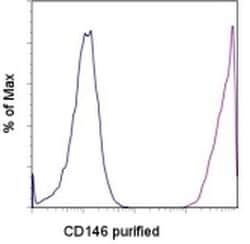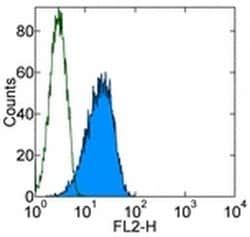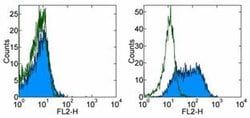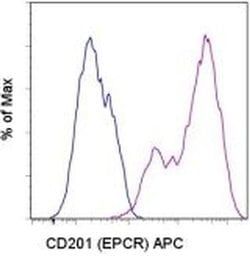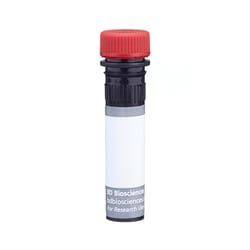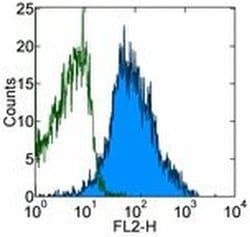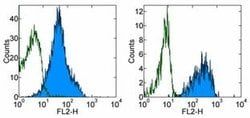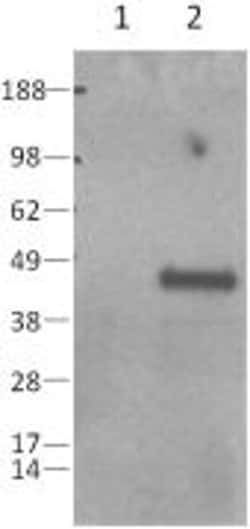CD230 (PrP) Monoclonal Antibody (4D5), eBioscience™, Invitrogen™
Manufacturer: Invitrogen
Select a Size
| Pack Size | SKU | Availability | Price |
|---|---|---|---|
| Each of 1 | 50-138-12-Each-of-1 | In Stock | ₹ 18,156.00 |
50-138-12 - Each of 1
In Stock
Quantity
1
Base Price: ₹ 18,156.00
GST (18%): ₹ 3,268.08
Total Price: ₹ 21,424.08
Antigen
CD230 (PrP)
Classification
Monoclonal
Concentration
0.5 mg/mL
Formulation
PBS with 0.09% sodium azide; pH 7.2
Gene Accession No.
F7VJQ1, P04156
Gene Symbols
PRNP
Purification Method
Affinity chromatography
Regulatory Status
RUO
Gene ID (Entrez)
5621
Content And Storage
4° C
Form
Liquid
Applications
Flow Cytometry, Immunoprecipitation, Western Blot
Clone
4D5
Conjugate
Unconjugated
Gene
PRNP
Gene Alias
AA960666; AI325101; Alternative prion protein; alternative prion protein; major prion protein; AltPrP; ASCR; BSE; CD230; CD230 antigen; CJD; GSS; KURU; major prion protein; major prion protein; alternative prion protein; major scrapie-associated fibril protein 1; MGC26679; p27-30; PK resistant core; prion protein; prion protein (p27-30) (Creutzfeldt-Jakob disease, Gerstmann-Strausler-Scheinker syndrome, fatal familial insomnia); prion protein precursor; prion protein precursor PrP; prion protein PrP; prion protein variant a; prion protein variant b; prion protein, PrP; prion protein, structural; prion-related protein; PRIP; Prn; Prn-i; Prnp; Prn-p; PrP; PrP<C>; PrP27-30; PrP33-35C; PrPc; PrPSc; Sinc; SIP; TSE
Host Species
Mouse
Quantity
100 μg
Primary or Secondary
Primary
Target Species
Human
Product Type
Antibody
Isotype
IgG1 κ
Description
- Description: CD230 (prion protein; PrP^C) is a 35 kD glycoprotein, attached to the cell surface via a GPI-anchor
- While the function of CD230 is unclear, prion protein has been the focus of research based on its involvement in transmissible spongiform encephalopathies (TSE), including Creutzfeld-Jakob disease in humans
- CD230 undergoes a conformational change in which the cellular PrP^C form is converted to the scrapie PrP^Sc form
- This conversion is essential for the infectiousness of prion-based diseases
- CD230 is predomitly expressed on the surface of lymphocytes and monocytes, with weak expression on granulocytes and erythrocytes
- In platelets, CD230 is expressed primarily intracellularly, and is upregulated to the surface upon activation
- Applications Reported: This 4D5 antibody has been reported for use in flow cytometric analysis and immunoprecipitation
- The 4D5 antibody has also been found useful for immunoblotting, recognizing a protein of approximately 35 kD under non-reducing conditions
- Applications Tested: The 4D5 antibody has been tested by flow cytometric analysis of normal human peripheral blood cells
- This can be used at less than or equal to 0.5 μg per test
- A test is defined as the amount (μg) of antibody that will stain a cell sample in a final volume of 100 μL
- Cell number should be determined empirically but can range from 10^5 to 10^8 cells/test
- Human prion protein (PrP), also known as PRNP, is a ubiquitously expressed GPI-anchored cell surface glycoprotein associating with lipid raft components and functioning as a signaling molecule
- PrP plays a role in apoptosis in a cell context-dependent manner, is involved in proliferation of epithelial cells and in distribution of junction-associated proteins in human enterocytes
- Conversion of this normal cellular prion protein (PrPc) into an abnormal conformer (PrPSc) is the crucial step associated with triggering the pathogenesis of the prion neurodegenerative disorders, such as the Creutzfeld-Jakob disease (CJD)
- Whereas PrPc is rich in alpha-helices, the PrPSc form has higher content of beta-sheets and is resistant to proteinase K.
